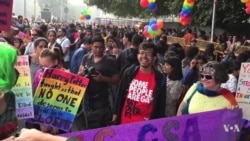Twenty-seven-year-old Debottam Saha recalls how as a gay man he became a victim of blackmail earlier this year.
“I went to meet a guy. Initially he was gentle,” Saha said. “After some time he started to threaten and say if you don’t give me money, I am going to slit your throat. I just had to give him money.”
He could take no legal recourse: According to a colonial-era law in India, gay sex is punishable by up to 10 years in prison.
The research scholar at the Indian Institute of Technology in New Delhi recently joined a group of 20 alumni and students from India’s elite engineering institutes called the IIT’s that has thrown its weight behind a long drawn out legal battle to overturn the controversial law that criminalizes homosexuality.
Optimism court will scrap law
There is widespread optimism that the Supreme Court will scrap the law: Earlier this month it heard several review petitions challenging its own 2013 ruling upholding the law. One of the petitions came from members of a pan-IIT group of mostly gay men called “Pravritti,” or Different Thoughts.
The IIT engineers say their decision to add their voices to activists who have spearheaded the battle is meant to demonstrate that India’s LGBT community does not live on the margins, but includes the country’s best brains — the IIT’s are seen as India’s Ivy Leagues and many of their alumni are on the frontlines of Silicon Valley companies.
Saha says their stories epitomize what the community suffers from — discrimination, trauma, intimidation, stigma, violence. The existence of the law has made it difficult to change society’s perceptions in a country that is still largely conservative.
He still recalls the stinging scolding from his father after his mother read about his attraction to boys in his diary when he was in grade seven. He was taken to consult a doctor “to change himself.”
And he went through school petrified about his secret getting out after another boy was severely punished for his sexual preferences.
“During break time he was put behind the class and the doors were closed and I don’t know what hell used to happen with him. And often at that point of time we were really scared, the next day it may happen with us.”
Support group's help
It was only while doing his postgraduate studies that an LGBT (lesbian, gay, bisexual, transgender) support group on campus helped him to put behind him the shame he had felt for years about his sexual preferences.
That, says another petitioner, 23-year-old Udai Bhardwaj, is the biggest problem — having to live with this secret inside them in their formative years. He has battled depression twice, the first time in school and later in college.
“My friend told me gay people should be set on fire. I had to hear that and that really affected me,” he said.
“I did take counseling, I did take medication and this is something very, very common in the LGBT community. As a community, people have gone through trauma in so many different ways,” said Bhardwaj, who now works for a LGBT-friendly multinational.
He only told his family about his sexual preferences two years ago and found them hugely supportive, which helped him join the petition and talk freely to the media. He admits he is the exception — he has many friends who can never hope for that kind of support.
“I thought with this petition it would be easier for kids to start coming out, it would be easier for kids to accept themselves, it would be easier for families to accept their kids,” Bhardwaj said.
The fact that only 20 of the 350-member group “Pravritti” could come out openly demonstrates the widespread stigma that surrounds homosexuality.
Battle for gay rights
The battle for gay rights has taken a tortuous route in India. The law criminalizing sexuality was scrapped in 2009 by the Delhi High Court but reinstated in 2013 by the top court, making India one of a handful of countries that outlaws gay sex.
However this month’s hearings come 10 months after the top court upheld privacy as a fundamental right and called sexual orientation an essential attribute of privacy. Some of the observations by the judges have also raised hopes in the community that the wind is finally blowing in their favor.
These petitioners also hope that their petition will raise sensitivity among college authorities about the need to support LGBT campus groups that number just a handful across the country.
“This is the only space where you can talk about your experience, your own stories without any intimidation, without any stigma or without feeling embarrassed about what you are,” Saha said.
















